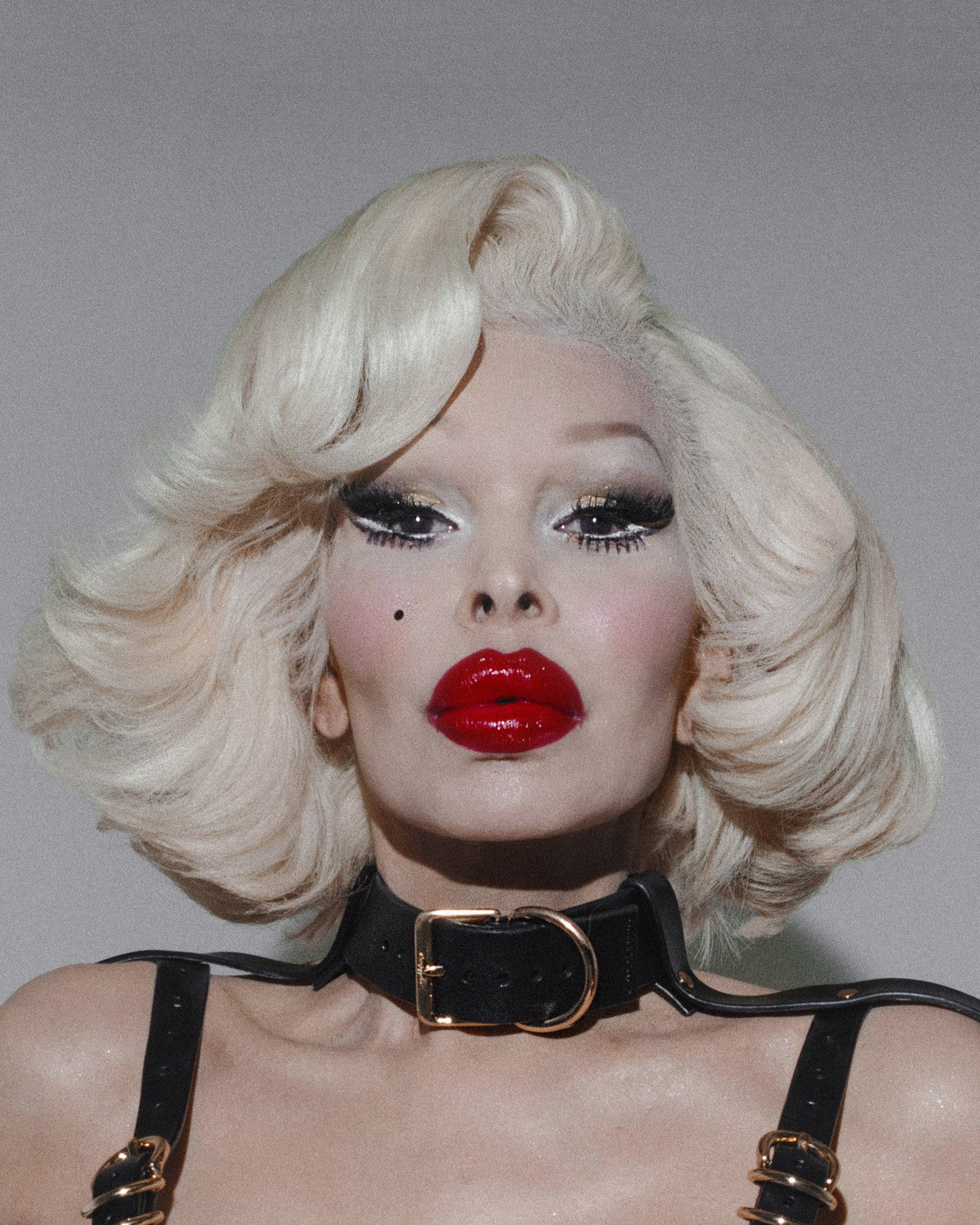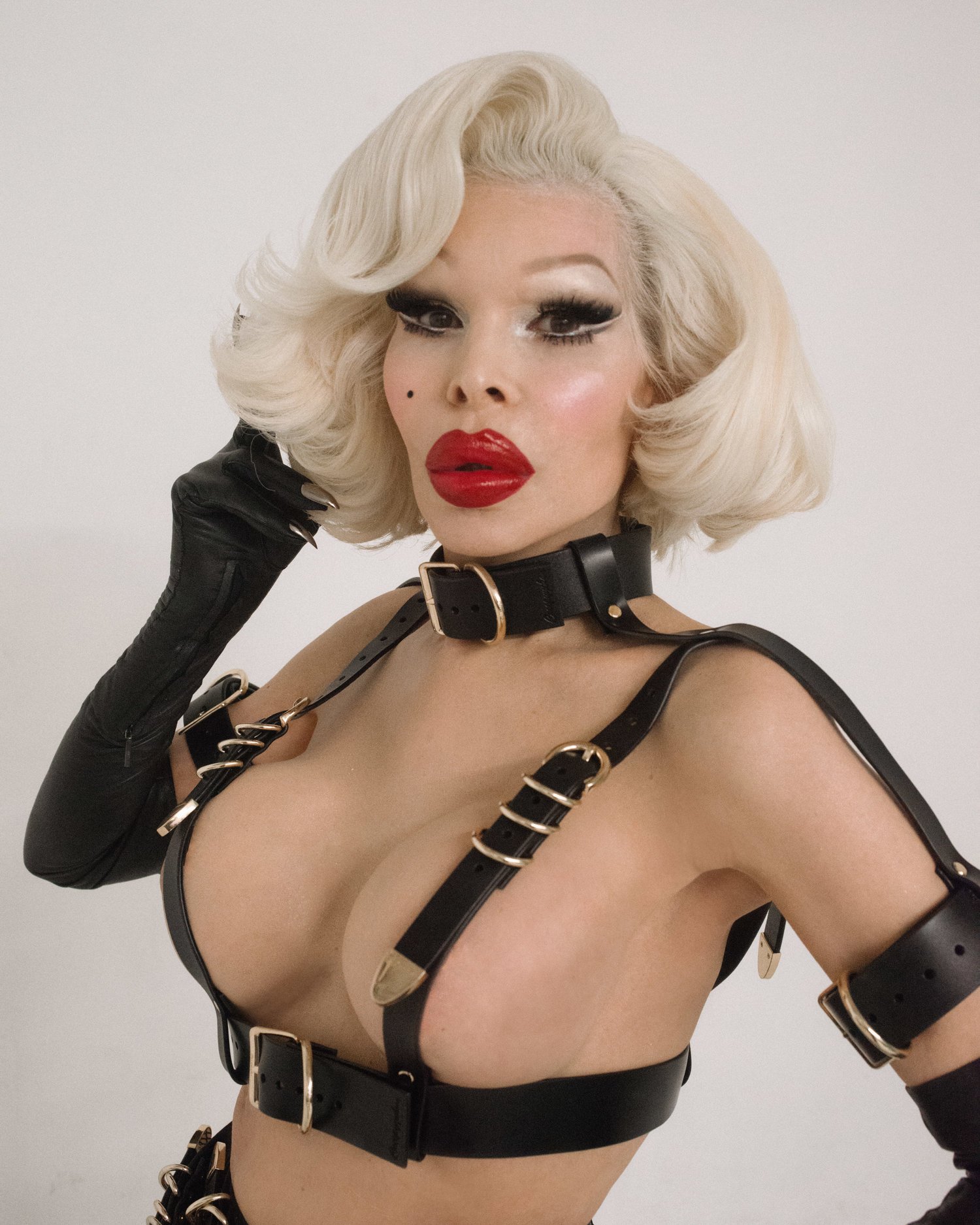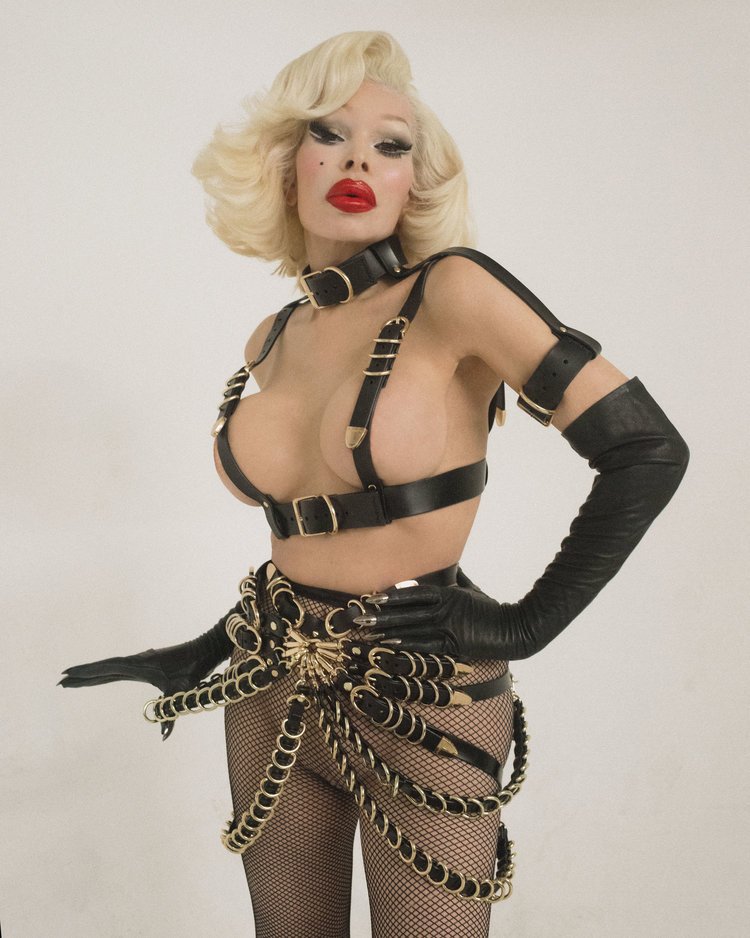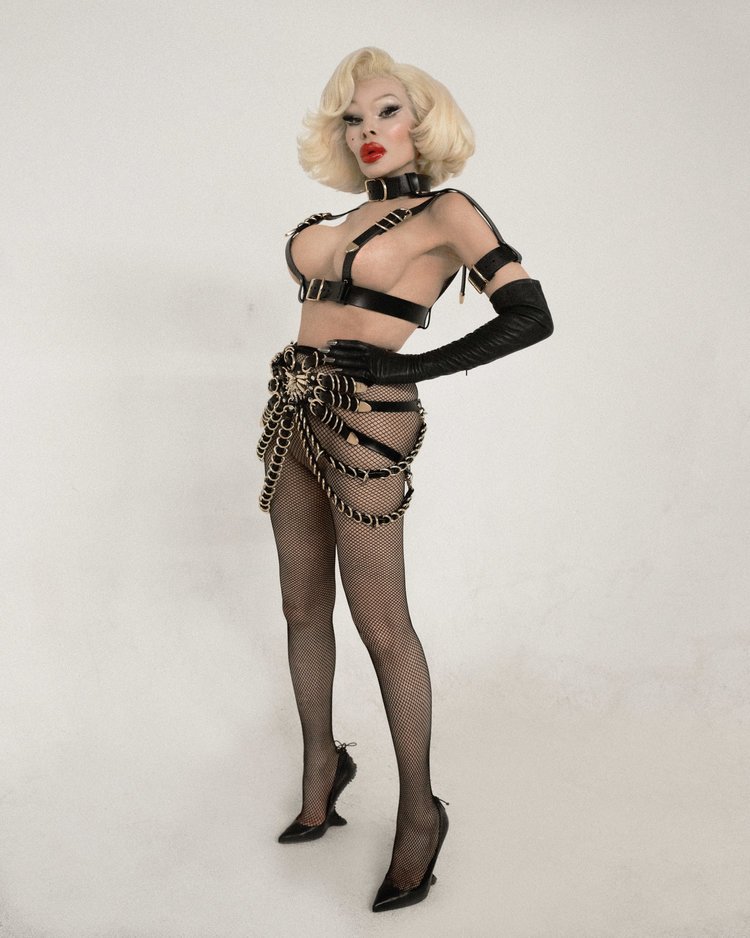“Don’t do drugs. Don’t murder someone." : Amanda Lepore on identity and dealing with the haters
This article originally ran in the printed edition of WUSSY vol.04.
For more photos and exclusives, you can order your copy here.
Once upon a time, in the shiny farcity of the All American nuclear family, a beautiful baby princess was born. Placed under a curse of arriving in untrue form, she lived quietly in a box waiting for, and wondering how, she would transform. Both her body and room encapsulated her in a cocoon she wished to emerge from, held together by threads of dreams that she had no idea how she would possibly reach.
Many of us are familiar with the legendary Amanda Lepore as a fierce nightlife diva who holds her own in tre magnifique composure without so much batting an eyelash at naysayers. No one would suspect as a youth she spent much tick-tock hiding, crippled with fear, dreading haircuts and dreary macho expectations pushed on little boys.
The Queer Gods looked upon this once timid babe and sent little rays of blessings via intimate moments with femininity in her 1970’s New Jersey suburb. These sparkling moments enticed Amanda, giving a glimmering glimpse of what her life could be. While her father’s command was callous and mother was often hospitalized for schizophrenia, a sweet nanny made space for judgement-free frolicking along with teaching Amanda the skill of sewing. More importantly, Amanda got to make merry with a true talisman of glamour: a razzle-dazzle-riffic dolly, who just so happened to also live in a box, by the name of Barbie.
“I need to be myself. It’s how I am most comfortable.”
While family reflected society, Amanda’s mother would sometimes protect her; sometimes Amanda protected her mother from episodes and outbursts. Her brother emitted apathetic airs and Amanda had little support while schoolmates harassed her. Undisputed, absolute determination forefronted Amanda’s youth, knowing from a very young age she was meant to be a girl. Her response when asked what her most defining moment: “My sex-change operation,” Amanda says with lightning speed, “becoming the person I was meant to be.”
Though the surgery’s financial assistance came through an abusive boyfriend’s father, a juxtaposition between salvation and subjugation, she moved onward, finding employment in beautification, with some sex work on the side. “When I worked as a Dominatrix, I was told that the clients would not be happy to find out I was not a ‘biological woman’ and get angry,” she explained. “I was always a bit nervous not knowing how they might react.” The risk was also met with thrilling confirmation: to be worshipped, feeling powerful with whip in manicured hand, in control. Amanda Lepore’s command over her future grew, though fame “was not something I anticipated”.
It’s impossible to separate Amanda Lepore from her club kid days, yet there is no doubt she has survived beyond this torrid time regardless of the changes around her. In religious dedication to her personal style, even with her eras of experimentation, whether cherry red hair, baby bangs, Vegas showgirl from outer space, Amanda’s aesthetic journey has been none other than her own. The NYC Club Kids pivoted on reinvention, but Amanda never really had to. She had her brand from the start and has been respected for this in collaborations. “When working with others, I let them know that I like to stick to my own style,” Amanda says of early to most recent photoshoots. “I need to be myself. It’s how I am most comfortable.”
Surprisingly, Amanda’s not a fan of substances even though she was a fixture amongst a whacked out trope of fashion freaks that devoured them. And as the story goes, the excess brought the heyday to a crash and burn. “Don’t do drugs,” Amanda warns, noting the most senseless horror to boot, “Don’t murder someone.” The Club Kids stomping grounds quickly turn into a ghost town, bombed into a dusty void, mostly due to Michael Alig’s maniacal actions. Clubs underwent interrogative lock-downs and the Queer fashionistas that were once outcasts, who found a comfortable coven to be themselves, saw their party come to an end. In a way, Michael Alig corralled beautiful weirdos that would grab the attention of the queer underground and in a sense helped create the street fashion, nightlife celebrity and widespread club culture massively accessible today, thanks to social media. The freedom and fantasy of these times meant a lot to Amanda, her first taste of real recognition and respect in a public eye, but she was swift and resolute in moving forward from the toxicity.
“Don’t do drugs. Don’t murder someone.”
Amanda stayed close to the few true blues in paving new avenues, such as trans sister Sophia Lamar and socialite designer Richie Rich, catwalking his Heatherette runway shows in the early ‘00’s. Nightlife energy and its music inspired Amanda to make tracks of her own, continuously releasing cheeky dance numbers since her 2005 debut, Introducing… Amanda Lepore. “Cazwell influenced me to start making music,” Amanda affirms as the popular gay rapper. “He wrote a lot of my songs, based on things that I actually say and do, and my personality. I thought it would be great to perform.”
With Cazwell’s technique and production pizzazz, Amanda’s sonic vision is imprinted with an adoration for disco and glam. Her latest EP, LEPORE., reflects this with David Bowie’s “Jean Genie”, more than an homage to the iconic androg alien but a touch on Americana rock’n’roll as well. Clubby remixes of “Champagne”, a banger about drinking bubbly morning, noon and night, shows the natural progression of incorporating music into her venue vamping: “I love being part of the nightlife scene and I feel that I am able to give more by performing.”
Of course her lyrics are full of sex appeal, flirtatious escapades and GLAMOUR, GLAMOUR, GLAMOUR. “I love Old Hollywood, Pin-Up Girl, Burlesque,” she concedes, never shy about her fem crushes. “I just saw Dita Von Teese while she was in NYC for her recent tour – I really admire her and love her live performances.” With sweet salutations, past beauty heroes are worn honorably on her bejeweled satin sleeves. When we asked what her favorite film is, she responds without pause: “Gentlemen Prefer Blondes – of course!” Her eloquent knowledge on the art of beautification was learned as a teen through neighbors with a home salon who would hairdress and discuss techniques practiced by movie starlets Elizabeth Taylor. When Amanda got her hands on some bleach, her foray into outer enchantment was lifted to new heights - literally. Just like Norma Jean, Amanda transformed from brown to white blonde and the glow already stirring inside shone brighter. And, like Marilyn Monroe and the Hollywood Babylon babes of yore, Amanda has a voracious appetite for a handsome man or two or few, the most important qualities in a gentleman being, “An attentive man - I like a lot of attention!”, she laughs.
“I do not let others’ negativity affect my life or my happiness.”
As Dave LaChapelle’s muse, Amanda found further fame thru his candy-coated pop photography, lifting her to icon status with his lens. “David LaChapelle actually nicknamed me ‘The Most Expensive Body On Earth’”, Amanda explains, referring to her plastic surgeries, joyfully. “I am flattered, of course!” LaChapelle and Amanda’s adoration for one another is evident, a creative collaboration beyond mutually beneficial. Above all, Lepore was not made to be someone’s plaything, unless she wanted to be, in all her love of the stage, for the camera, or after hours with a special friend. Lepore rightfully transcended from the focus on the golden artist whose ego erratics make and tear down their models. LaChapelle’s spotlight on his Muse, with deep respect, may have been the real turning point in making Amanda Lepore a legend.
In real life, Amanda is a cool and collected yet very warm and personable tiny woman with amazing curves. She practices boundaries and clean routines to reach this overall sense of Zen. “I cherish my fans and seeing people happy! I am always occupied with things I love to do: performing, working on my outfits and accessories, eating healthy and doing yoga, not focusing on anything negative,” she says. Amanda does not worry of old age, “It’s not something I think so much about as I prefer to live in the present.” She only peers a little into the future, taking delight in the little things that come her way. Whether it’s the Louboutin Sample Sale or fan mail, little indulgences live atop her self-love sundae. “I do a lot of online shopping, so I am always excited to receive packages, especially when I am out of town. I come home to lots of packages!”
This maven of nightlife flipped the trans script, building a realm of light and love around her, made most effective by her complete disinterest in frienemies. How does she deals with toxic people and difficult personas? “I don’t!” she replies. “I keep myself surrounded by positive people and influences. I do not let others’ negativity affect my life or my happiness.” Furthermore, her simple yet effective mantras could be of benefit to struggling queers. “Keep your head held high and always be yourself. Keep yourself surrounded by positive people and the people who support you,” she says.
Regardless of the perils with parents, the patriarchy, fearful situations as a woman in love, thru objectification by power hungry scenesters and haters galore, her body a battlefield, Amanda Lepore has found her peace within a world of chaos. To some she is seen as plastic, both by TERFs and contemporary trans activists who ironically look down on a woman’s right to choose what she does with her own body. She is so much more than a femme fatale with an appetite for men and money. In her beautifully penned memoirs, Doll Parts, Amanda Lepore details how she has discovered her strengths along the way of shaping (both literally and figuratively) the person she wanted to become.
Queer history books are full of fairy tales unfulfilled. We look back at Candy Darling, a muse of Andy Warhol’s, one of many outrageous NYC wild childs who culminated into celebrity. Candy’s premature death was often viewed as an afterthought to Andy’s intense fame, when in reality what would Andy be if he wasn’t such a shifty slumlord in the cult of personalities? Without Candy and so many others, Warhol wouldn’t have the amount of fame he does today. Too many times have brave beautiful spirited trans women been sidekicks and side notes in the past.
Amanda is the center of her own fairytale come true. She has reached beyond perceived limitations into a destiny she herself didn’t even know would be real. Thank you Amanda Lepore for being yourself and doing whatever it is you damn well please! You deserve all the best xo
—
Photography by Mateus Porto @orograph
Harness by Yeha Leung @creepyyeha
Sunni Johnson is the Arts Editor of WUSSY and a writer, zinester, and musician based in Atlanta, GA.
Archive
- February 2025
- November 2024
- October 2024
- September 2024
- August 2024
- July 2024
- June 2024
- May 2024
- April 2024
- October 2023
- July 2023
- June 2023
- May 2023
- April 2023
- March 2023
- February 2023
- June 2022
- April 2022
- March 2022
- January 2022
- December 2021
- October 2021
- September 2021
- August 2021
- July 2021
- June 2021
- May 2021
- April 2021
- March 2021
- February 2021
- January 2021
- December 2020
- October 2020
- September 2020
- August 2020
- July 2020
- June 2020
- May 2020
- April 2020
- March 2020
- February 2020
- January 2020
- December 2019
- November 2019
- October 2019
- September 2019
- August 2019
- July 2019
- June 2019
- May 2019
- April 2019
- March 2019
- February 2019
- January 2019
- December 2018
- November 2018
- October 2018
- September 2018
- August 2018
- July 2018
- June 2018
- May 2018
- April 2018
- March 2018
- February 2018
- January 2018
- December 2017
- November 2017
- October 2017
- September 2017
- August 2017
- July 2017
- June 2017
- May 2017
- April 2017
- March 2017
- February 2017
- January 2017
- December 2015
- November 2015
- October 2015
- September 2015
- August 2015
- July 2015
- June 2015
- May 2015
- April 2015












